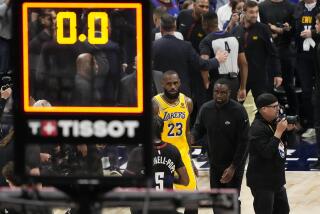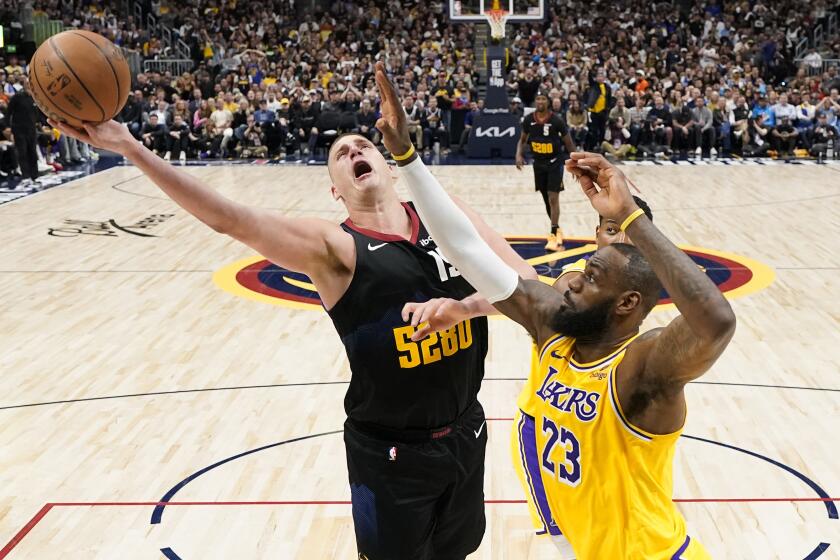The year New York really got Yanked
THE most surefire story line for a sports movie is Triumph Over Adversity, in which all problems are solved as the Big Game is won or the miracle finish achieved, as in “Rudy,” “Remember the Titans” or “Cinderella Man.”
But ESPN’s eight-part “The Bronx Is Burning” offers a variation on the theme as it looks back on the 1977 New York Yankees. It’s a Triumph Over Ego saga. Or maybe Triumph of Ego. For like the best sports stories, this one understands that the most intriguing element is not the action on the field but the crazy humans who play out their passions there. Many of us know the destiny of that Yankees team of 30 years ago: Reggie Jackson will hammer out three home runs on three Dodgers pitches in the sixth game of the World Series to give George Steinbrenner his first title as Yankees owner and Billy Martin his only ring as manager of the boys in pinstripes.
For the record:
12:00 a.m. July 8, 2007 For The Record
Los Angeles Times Tuesday July 03, 2007 Home Edition Main News Part A Page 2 National Desk 1 inches; 64 words Type of Material: Correction
Yankees: A caption with a photograph from the coming ESPN series “The Bronx Is Burning” in Sunday Calendar said it showed Daniel Sunjata portraying player Reggie Jackson. It was Bill Forchion, playing coach Elston Howard. Also, the caption incorrectly said the Yankees were celebrating their 1977 World Series victory. It showed a scene portraying the team celebrating the winning of the American League pennant.
For The Record
Los Angeles Times Sunday July 08, 2007 Home Edition Main News Part A Page 2 National Desk 1 inches; 65 words Type of Material: Correction
Yankees: A caption with a photograph from the coming ESPN series “The Bronx Is Burning” in Calendar on July 1 said it showed Daniel Sunjata portraying player Reggie Jackson. It was Bill Forchion, playing coach Elston Howard. Also, the caption incorrectly said the Yankees were celebrating their 1977 World Series victory. It showed a scene portraying the team celebrating their winning the American League pennant.
But we also know that there would not be happy endings in the long run for at least two of those men whose first names alone identified them -- Billy was doomed to a humiliating pattern of firings, rehirings and drinking, then a fatal crash in 1989, and George was doomed to be ... well, George, the owner with an insatiable need to win, so the last title was never enough.
As they say, though, the pleasure is in the journey -- in this case, how these egos work one another, as when Steinbrenner (played by Oliver Platt) tries to lure free agent Jackson (Daniel Sunjata) to New York during a lunch at the fancy restaurant 21.
“I thought it would be a little ritzier,” Jackson says. “Looks like a place in [San Francisco’s] North Beach.”
“Let me tell you something, my friend,” replies the shipbuilder-turned-team owner. “... Play for me here, the sky’s your limit, my friend.... What do you want more than anything?”
“A Rolls, George. A Rolls-Royce Corniche.”
“Well, I guess you’ll have to have one, won’t you?”
Soon after, a cab pulls up and the driver shouts, “Yo, Reggie, we need you in New York!”
Watching the scene, viewers may miss that it’s current Yankee Jason Giambi doing a cameo as the cabby whose recruitment pitch prompts a skeptical Jackson to ask Steinbrenner, “You payin’ these people?”
The ESPN project, which premieres July 9 and will run over eight weeks, is based on Jonathan Mahler’s book “Ladies and Gentlemen, the Bronx Is Burning” and other sources documenting the Yanks’ comically (in retrospect) chaotic championship season, set against the not-so-comic chaos in the city, the worst being not the garbage and graffiti but a serial killer on the loose, the “Son of Sam.”
As the body count rises, the city can turn to the soap opera of Steinbrenner trying to tell Martin (John Turturro) what batting order to set -- in particular that he bat Jackson fourth, the prestigious “cleanup” spot usually reserved for a team’s most dangerous hitter. Martin bristles at the owner’s meddling, then makes his counterpoint by putting players’ names on slips of paper, sticking them in a hat and inviting Jackson to pull one at a time.
“What exactly am I doin’ here, skip?”
“You’re pickin’ the battin’ order. Keep goin’.”
”... You’re actually going to go with this?”
“I’m a baseball genius. Haven’t you heard?”
The punch line is that the team indeed starts winning then. But the hot streak that makes the season does not begin until Martin gives in and does bat Jackson in his accustomed cleanup spot -- on the day police arrest David Berkowitz, the pudgy killer who was having conversations with the dog of his neighbor, Sam Carr.
Hot property
SUCH real-life touches were what prompted ESPN to acquire the rights to “The Bronx Is Burning,” according to Ron Semiao, who earned genius status himself, at least within the network, when he saw the market possibilities of extreme sports such as skateboarding and created the “X Games.” Semiao now serves as senior vice president of ESPN Original Entertainment, which has produced a succession of scripted sports films and series, including “A Season on the Brink” and “The Junction Boys,” about two hard-nosed college coaches -- basketball’s Bob Knight and football’s Paul “Bear” Bryant -- and “Ruffian,” about the filly who had to be destroyed after her match race with Kentucky Derby winner Foolish Pleasure, a reminder of another sports film formula, the Tear Jerker, exemplified by such stories as “Pride of the Yankees,” “Bang the Drum Slowly” and “Brian’s Song.”
Though these projects work because of their off-field dynamics, their soap operas, ESPN executives believe that one of their dramatic re-creations -- 2005’s “Code Breakers,” about a cheating scandal that devastated the West Point football team -- failed to resonate with viewers because it strayed too far from sports. It might just as easily have been about the debate team.
A more proven approach is Raw Reality, directed at mass-appeal sports, pioneered by a 1970 baseball book, Jim Bouton’s “Ball Four,” followed by the football-themed “Semi-Tough” and “North Dallas Forty,” all of which suggested that earlier accounts had given sanitized versions of athletes’ antics in the locker room and bedroom. ESPN tried that in 2003’s football-themed “Playmakers,” which showed a player using another’s urine to pass a drug test but drew objections from the NFL that it was tarnishing the image of a sport that provided lucrative programming to ESPN.
“Look, we’re certainly not in the business of upsetting our rights-holders, so after one year we just decided that it would be best not to continue,” recalled Semiao, who noted that no one can accuse “The Bronx Is Burning” of fictionalizing its wildest moments. Live TV, after all, showed Martin and Jackson coming to blows in the dugout after the manager pulled his right fielder from a game for what he thought was less than full effort.
What’s more, many scenes basically have the trio telling reporters things the real-life characters were quoted as saying. There’s Jackson comparing himself to a fictional bird (“Jonathan Livingston Seagull. It’s my favorite book.... He’s an outcast ... and even when he shows his courage and skill, they expel him....”) or famously declaring, before he’d even played a game with the Yankees, “I’m the straw that stirs the drink.”
Like many involved in the project, Semiao is a sports fanatic who does not need a script to tell him what happened to the ’77 Yanks. As a University of Bridgeport (Conn.) senior (and pitcher), he joined three dorm mates in doing what it took to get $10 bleacher seats for all three World Series games played at Yankee Stadium that October. “All you needed to do was have the fortitude to sleep overnight in the South Bronx,” said the New England-raised ESPN executive who despite that World Series remains at 50 a fan of the rival Boston Red Sox.
ESPN viewers average “about 41, 42,” so Semiao is counting on them wanting to relive childhood memories of the “Bronx Zoo”-era Yankees. And although the project targets the older end of the ESPN audience, he’s hoping they’ll plant their kids before the set too to give them a baseball history lesson.
The project’s executive producer, Mike Tollin, also was at the ’77 Series, “the first ... I ever went to” and later, as part of L.A.-based Tollin/Robbins Productions, turned out sports films and documentaries, including “Varsity Blues,” “Coach Carter,” “Radio” and “Hank Aaron: Chasing the Dream.” Many embrace the overcoming-adversity theme, but Tollin also has learned from the mistakes of sports films -- as when 1948’s “The Babe Ruth Story” tried to convince viewers that actor William Bendix’s pathetic left-handed swings could produce the Bambino’s mammoth homers.
In “The Bronx Is Burning,” they cast Sunjata, of TV’s “Rescue Me,” in part because “Daniel is a left-hander with a sweet swing,” Tollin said. Even so, in the climactic moments when this classic backstage drama does take to the field for game action, they splice in footage of the authentic Reggie Jackson doing his thing. The lesson: “Let the real guys do the slugging.”
The real George Steinbrenner is ailing these days and keeping a low profile, but it would be interesting to hear what he thinks of casting another Red Sox fan to play him. Oliver Platt picked up that affinity while attending Tufts University. “You go to a game at Fenway and you’re hooked,” he explained.
But Platt cites the advice of an acting teacher that no matter who you play, “Jesus Christ, Satan or whatever, imagine yourself before the Pearly Gates arguing this guy’s way into heaven.” So although he did not want to make Steinbrenner unrealistically warm and cuddly, he did want to make the case for him as a pioneering, out-front owner, like Mark Cuban today, involved in more than putting “meat in the seats.” Platt saw the Yankees owner as vulnerable, for all his bluster, because of a demanding father who used to fire him, much as Steinbrenner would later fire Martin time and again.
Viewers are invited to feel for Steinbrenner as he tapes motivational talks he wants played for the team but which Martin has no intention of playing. Their sparring begins in their first encounter, when Steinbrenner is trying to seduce the former journeyman second-baseman to manage his team, saying, “You were my favorite Yankee. I’ll bet you don’t hear that a lot.”
Martin is almost taken in, except for a detail in his contract, “this mumbo jumbo about my conduct. I can’t criticize you -- you can fire me without pay. If you want me so bad, why do I have to put up with that?”
They had to put huge artificial ears on Turturro every morning to turn him into Martin, but he found his own way to get into the psyche of the tempestuous yet insecure manager (“a pretty naked guy”) faced with such a boss. The New York-bred actor compares Steinbrenner to a producer or publisher who wants to lord over creative details beyond his ability. Plus, why was George always calling Billy “kid,” though the manager was two years older?
Turturro, who made his mark in the Coen brothers’ edgy films (“Miller’s Crossing,” “Barton Fink,” “O Brother, Where Art Thou?”), is, not surprisingly, no fan of happy endings, though as a mythic tale “O Brother” was allowed one. In “The Bronx Is Burning,” scripted by James D. Solomon and directed by Jeremiah S. Chechik, the Yankees were a great diversion from the city’s sad scenes, “not a remedy,” Turturro noted. He notes that at another tough time, in 2001, the Yankees again made the Series -- lifting spirits in the wake of the terrorist attacks -- but lost. “If the Yankees would have won, it would have been too storybook-ending,” he reasons. “In life, you don’t have happy endings.”
The catch here is that Reggie did hit those three home runs on three pitches, the last as mythic a blast as there ever was in baseball.
Although no one wanted to give away the ending details, the actors said they hoped they’d left what Platt calls an “ashes in the mouth” taste, the letdown that follows many triumphs, the strange sense of emptiness.
Turturro said he heard that the last visitors to the locker room saw Jackson and Martin in the manager’s office, not gloating but talking, “Next season we’re going to do this, do that.”
When it comes to sports movies, he’s a connoisseur of boxing stories, in which the hero sometimes scores a knockout ending -- but not in the best, such as “Raging Bull.” In the first “Rocky,” he reminds us, the catharsis is in Sylvester Stallone remaining on his feet, “but he actually lost, you know?”
--
More to Read
Get our high school sports newsletter
Prep Rally is devoted to the SoCal high school sports experience, bringing you scores, stories and a behind-the-scenes look at what makes prep sports so popular.
You may occasionally receive promotional content from the Los Angeles Times.






